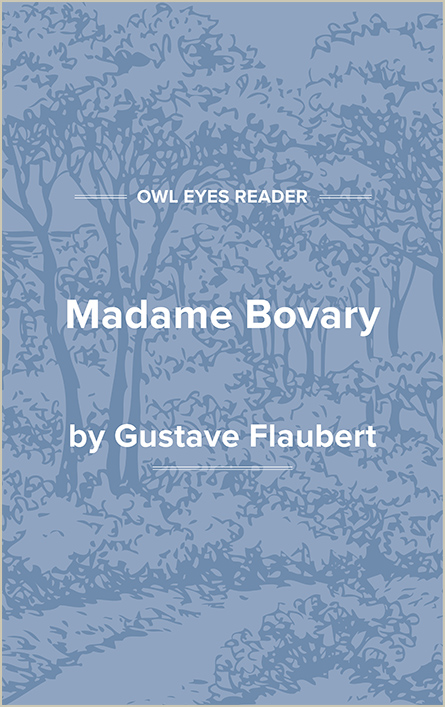Study Guide
Analysis Pages
Summary
Charles Bovary is a student of medicine who marries for his own advancement a woman much older than himself. She makes his life miserable with her nagging and groundless suspicions. One day, Charles is called to the bedside of Monsieur Rouault, who has a broken leg, and there he meets the farmer’s daughter, Emma, a beautiful but restless young woman whose early education in a French convent has given her an overwhelming thirst for broader experience. Charles finds his patient an excellent excuse to see Emma, whose charm and grace has captivated him.
Charles’s whining wife, Héloise, however, soon suspects the true reason for his visits to the Rouault farm. She hears rumors that in spite of Emma’s peasant background, the girl conducts herself like a gentlewoman. Angry and tearful, Héloise makes Charles swear that he will not visit the Rouault home again. Unexpectedly, Héloise’s fortune is found to be nonexistent. There is a violent quarrel over her deception, followed by a stormy scene between her and Charles’s parents, which brings on an attack of an old illness. Héloise dies quickly and quietly.
Charles feels guilty because he has so few regrets at his wife’s death. At old Rouault’s invitation, he returns once more to the farm and again falls under the spell of Emma’s charms. As old Rouault watches Charles fall more deeply in love with his daughter, he decides that the young doctor is dependable and perfectly respectable. He forces the young man’s hand, telling Charles he can have Emma in marriage and gives the couple his blessing.
During the first weeks of marriage, Emma occupies herself with changing their new home. She busies herself with every household task she can think of to keep herself from being utterly disillusioned. Emma realizes that even though she thought she was in love with Charles, she does not feel the rapture that should have come with marriage. All the romantic books she has read have led her to expect more from marriage, and the dead calm of her feelings is a bitter disappointment. Indeed, the intimacy of marriage disgusts her. Instead of having a perfumed, handsome lover in velvet and lace, she finds herself tied to a dull-witted husband who reeks of medicines and drugs.
As Emma is about to give up all hope of finding any joy in her new life, a noble patient whom Charles has treated invites them to a ball at his chateau. At the ball, Emma dances with a dozen partners, tastes champagne, and receives compliments on her beauty. The contrast between the life of the Bovarys and that of the nobleman is painfully evident. Emma becomes more and more discontented with Charles. His futile and clumsy efforts to please her only make her despair at his lack of understanding. She sits by her window, dreams of Paris, and then becomes ill.
Hoping a change would improve her condition, Charles takes Emma to Yonville, where he sets up a new practice and Emma prepares for the birth of their child. When their daughter is born, Emma’s chief interest in the child is confined to laces and ribbons for her clothes. The child is sent to a wet nurse, where Emma visits her, and where, accidentally, she meets Léon Dupuis, a law clerk bored with the town and seeking diversion. Charmed with the youthful mother, he walks home with her in the twilight, and Emma finds him sympathetic to her romantic ideas about life.
Later, Léon visits the Bovarys in company with Homais, the town chemist. Homais holds little soirees at the local inn, to which he invites the townsfolk. There, Emma’s acquaintance with Léon ripens. The townspeople gossip about the couple, but Charles is not acute enough to sense the nature of the interest Emma has in Léon.
Bored with Yonville and tired of loving in vain, Léon goes to Paris to complete his studies. He leaves Emma brokenhearted and deploring her weakness in not having given herself to Léon. She frets in her boredom and once more makes herself ill, but she has no time to become...
(The entire page is 1,513 words.)
Owl Eyes subscribers get unlimited access to our expert annotations, analyses, and study guides on your favorite texts. Master the classics for less than $5/month!

